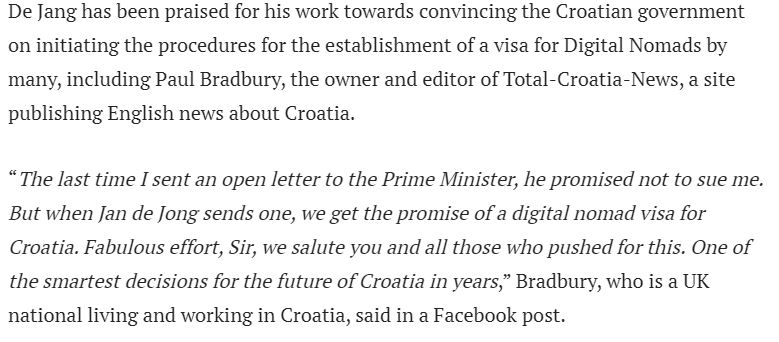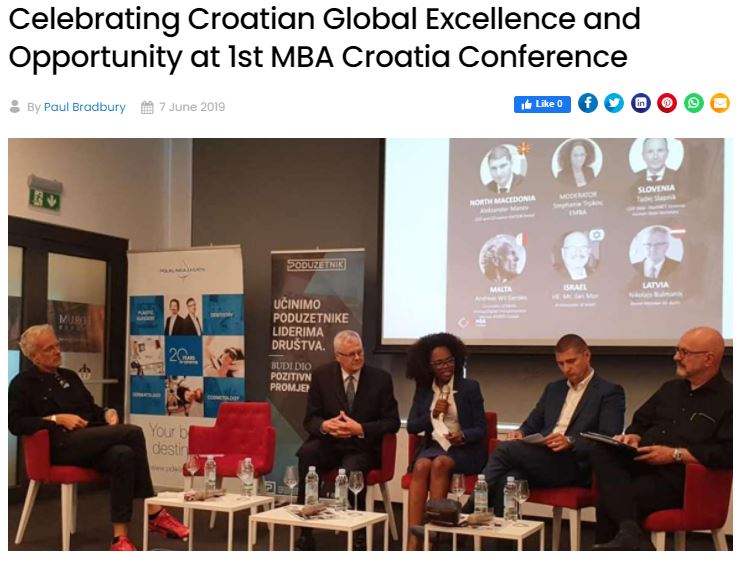Working From Home Erases Line Between Working Hours and Private Time - Round Table
ZAGREB, October 5, 2020 - The Bridge party organised a round table on Monday on the topic "Working from Home: Do we have the right of disconnect", which discussed amendments to the Labour Act due to the coronavirus, where a lot of people work from home and the line between working hours and private time disappears.
The discussion was organised following announcements that changes would be made to the Labour Act. A lot of workers work from home due to the coronaviurs situation and in many cases have to work more and need to be available all the time.
"It has been seen in practice that work from home often leads to an overlap between working hours and private time and that the fine line is being moved or erased completely," president of the Independent Croatian Unions, Kresimir Sever, said.
He explained that an employee's working hours with an employer are clearly defined, but if that employee starts working from home, a good portion of employers abuse that and expect employees to work a lot more, leaving less time for leisure activities.
"Until such time that that system is put in order, we cannot talk about real remote work," said Sever.
He added that times of crises are not a good time to amend laws.
"Laws should not be adapted to crisis situations, but should be regulated during normal times, emphasising that a crisis may occur," he said.
He warned that the crisis situation is being exploited to introduce a more flexible labour system in Croatia which is unacceptable for the unions, and all under the guise that remote work has to be regulated.
"The Labour Act is extremely flexible in Croatia. It allows employers a wide spectrum to arrange labour relations. The thing that would provide real flexibility is collective bargaining and there is very little of that in Croatia," Sever believes.
Viktor Gotovac from the Labour and Social Law Department at the Faculty of Law does not agree that the law is good as it does not regulate remote working.
"That means that the law is not good. We have student contracts, employing pensioners, author's contracts, everything just not to change the law... I worked form home after the earthquake and my employer immediately cut off my travel allowance, but I was not paid for using my own premises, resources," Gotovac underlined.
He did not agree that the coronavirus caused the problem but rather pointed out what needs to be changed for a better legislative framework which would regulate wages, working hours and leave.
For the latest travel info, bookmark our main travel info article, which is updated daily.
Read the Croatian Travel Update in your language - now available in 24 languages
The Guardian Highlights Croatian Digital Nomad Visa, Progress Update
September 30, 2020 - As the story spreads slowly in the mainstream global media, a Croatian digital nomad visa update.
Whisper it quietly, but the story is gathering pace and attracting increasing international attention and coverage.
Just 44 days after Split-based Dutch entrepreneur Jan de Jong invited Croatian Prime Minister Andrej Plenkovic to introduce digital nomad visa for Croatia in an open letter on LinkedIn back on May 11, 2020, Plenkovic announced his government's intention to introduce the visa, following a meeting with de Jong. The topic was appended to the updating of the Foreigners Act and introduced to Parliament the next day.
Do Jong has been very active in meetings with no less than six ministries since that commitment, as Croatia moves with uncharacteristic bureaucratic speed to introduce the visa, making it only the second country in Europe (after Estonia) and the fifth in the world to offer the nomad visa. With Croatia one of the top tourism and lifestyle destinations in Europe, strong remote worker interest in Croatia has so far been somewhat restricted by Croatia's famous bureaucracy. Non-EU residents can currently only stay for 90 days at a time, but the new visa will allow a 12-month stay for bona fide nomads, who can tick a checklist of requirements, include health insurance, no criminal record, and proof of a certain level of income (this is expected to be lower than Estonia).
I spoke to de Jong earlier today, who said that things are very much on track. His latest meeting last week was with the Ministries of the Interior and Finance, together with a tax expert who helped draft the Estonian digital nomad visa law, and the Croatian tax authorities. Discussions went well, and his feedback from the ministries is that all issues should be solved by the end of the year, paving the way for the introduction of the visa in 2021.
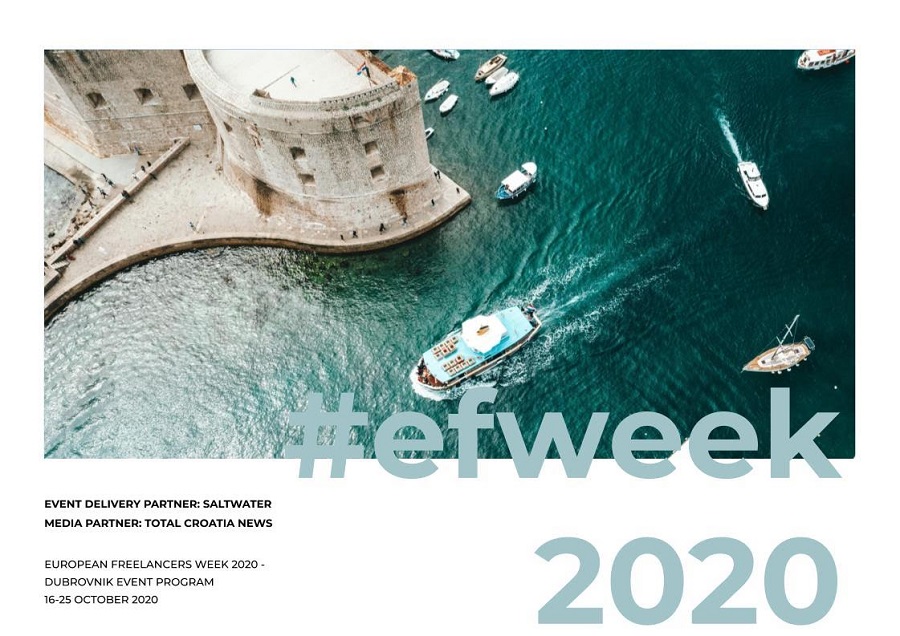
The announcement has caused plenty of interest among the global nomad community, and it has led to various initiatives around Croatia to prepare the country for this new type of tourism, including the TCN/Saltwater partnership with the City of Dubrovnik and Dubrovnik Tourist Board announced earlier this week (read more in Dubrovnik Embraces Digital Nomads: October EF Week Events, April International Competition).
The new initiative received perhaps its biggest coverage so far yesterday, as The Guardian highlighted Croatia as one of the first five countries to open its borders to digital nomads in The rise of the 'half-tourist' who combines work with a change of scene.
And it was nice to see a mention of TCN in the accompanying links...
The digital nomad visa initiative has been entirely a private one until it reached the Prime Minister's desk (you can learn more about the journey here), and the considerable media coverage generated has all been organic.
It is part of a growing trend of concrete results which are coming from writing about the positives and opportunities in Croatia, which the entrepreneurial sector are quietly pushing forward.
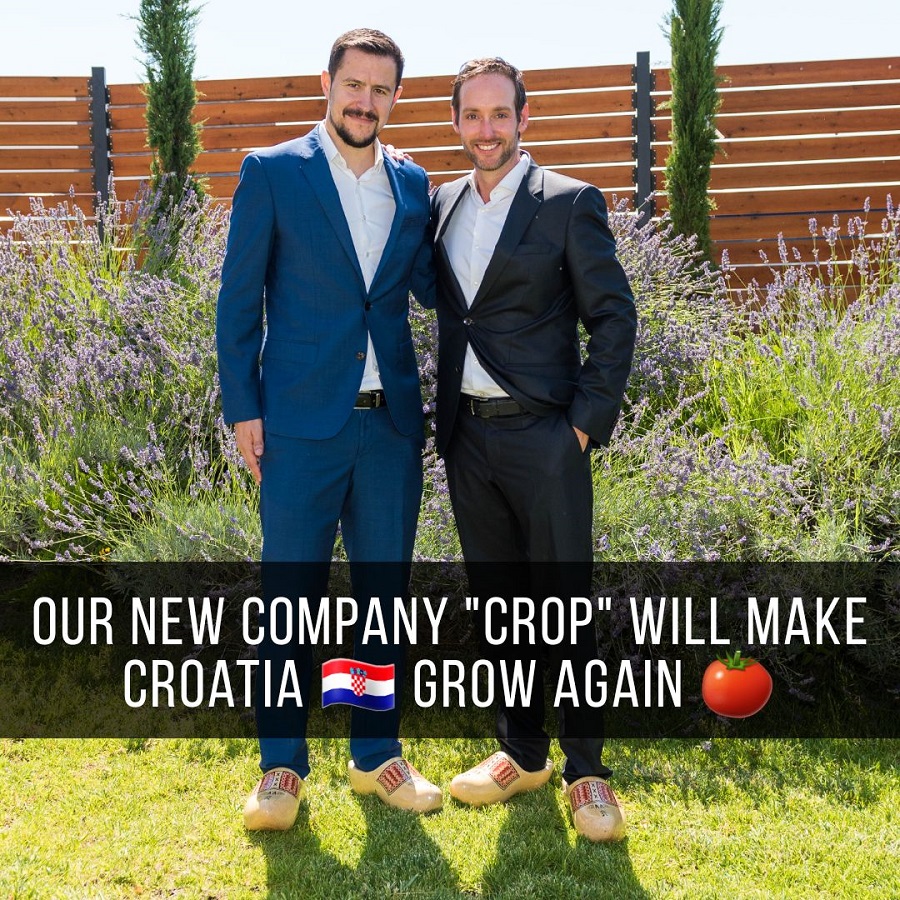
Another excellent example of this also involves de Jong and Dalmatian business partner Jerko Trogrlic, who recently started an initiative to combine Dutch technology and know-how with Croatian labour (creating 72 jobs) to grow tomatoes on a 5-hectare plot in an economically depressed part of northern Croatia (read more in CROP Croatia: Jerko Trogrlic and Jan de Jong to Make Croatia Plant Again).

Within days of announcing the initiative on LinkedIn, de Jong had received more than 5 million euro of investment offers from all over the world. And the international agriculture media has already picked up on the story, see above.
There are so many positive initiatives taking place in Croatia at the moment. And if we can start to slowly move away from the default negative mindset and start to celebrate successes rather than keep them under the radar (a Croatian can forgive you anything but success is one of the great truisms here), the arrival of Croatia 2.0 will be all the quicker, and there will be more investments, success stories and jobs created.
For the latest in the digital nomad world in Croatia, follow the new TCN digital nomad news section.
Croatia's Digital Nomad Visa: A Progress Report
September 10, 2020 - First the announcement, then the hard work - an update on progress of Croatia's digital nomad visa initiative.
An inspiring day in Zagreb today, as TCN took part in the 2nd Poduzetnicki Mindset (Entrepreneurial Mindset) conference, which took virtually and was broadcast from Kaptol Cinema in Zagreb.
I was joined by Dutch entrepreneur Jan de Jong, as we interviewed each other on our foreign entrepreneurial journeys during our combined 30+ years of living in Croatia. It was a chance to interview Jan on the progress of the Croatian digital nomad visa initiative, which seems to be moving forward smoothly, if his latest LinkedIn updates are anything to go by.
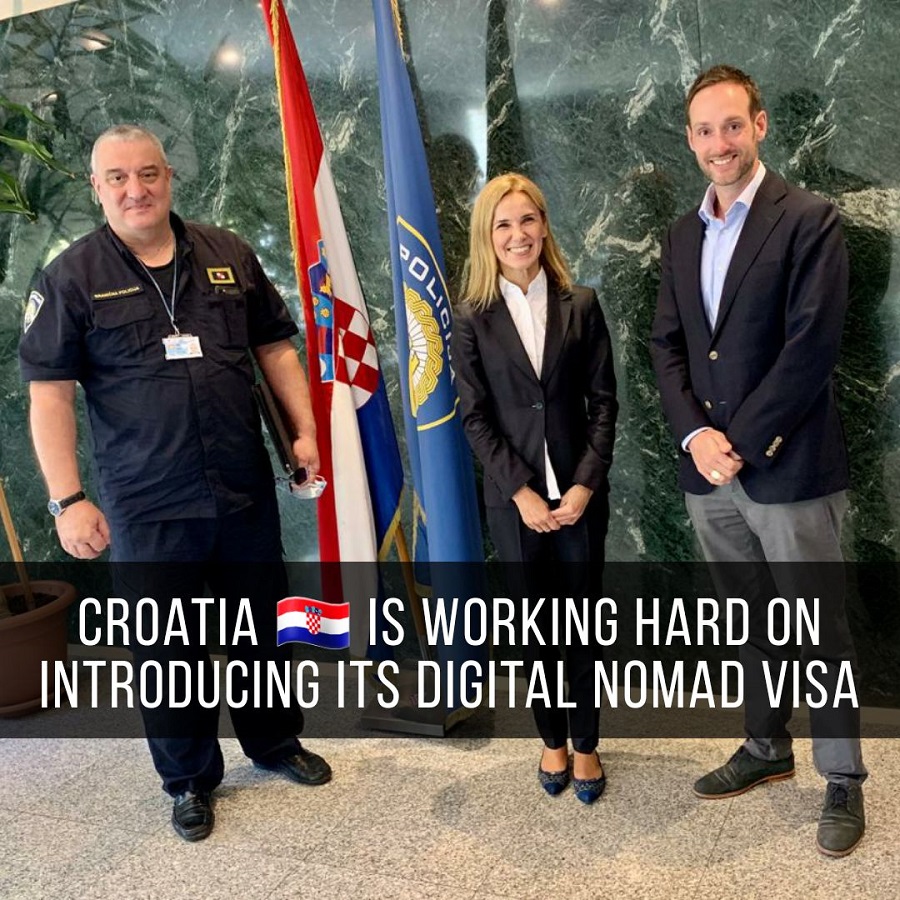
Today I took part in a hands-on operational meeting - led by State Secretary at the Ministry of Interior - Terezija Gras & head of border control - Zoran Ničeno.
The meeting also included representatives from the Ministries of Interior, Finance, Labor & Croatian health insurance institute.
Step by step, brick by brick - Croatia is paving the road to start welcoming digital nomads.
Yes, I agree - this task is only done when it is done, but to all the sceptics out there I just want to say that personally I only see great progress.
Above all, I see a strong will and desire from all ministries involved to make this happen.
Next up is an in-depth session with Ministry of Finance, after which we will re-group again with all other ministries. During that meeting we will then solely talk about solutions.
The question will not be "can Croatia do this?" but "how can Croatia do this?"
Are you believing in Croatia's digital nomad visa as much as I do?
To all digital nomads out there - feel free to start day-dreaming about your Mediterranean home office.
Follow me on #LinkedIn. New updates following soon!
#livingthecroatiandream #croatia #digitalnomads #entrepreneurship #wfh
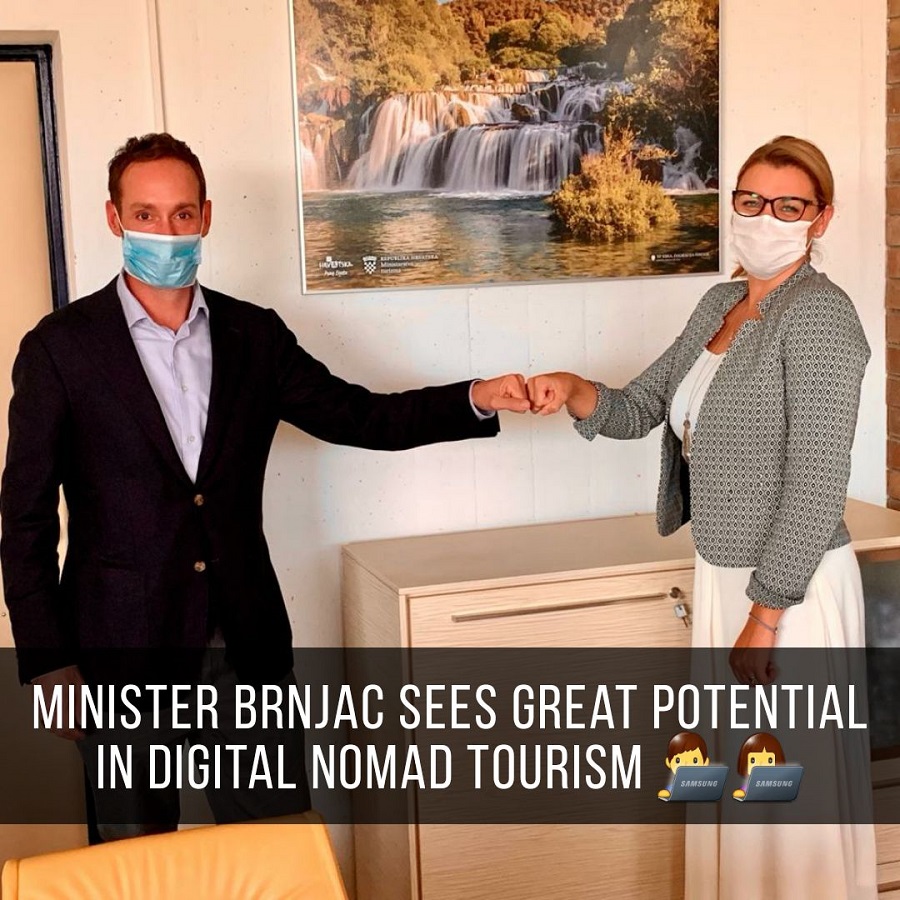
What if we can turn Croatia into a year-round tourism destination - where digital nomads can spark long-term sustainable tourism in Croatia...
Minister Nikolina Brnjac is having a lot on her plate these days. As the responsible minister of 20% of Croatia's GDP - which has been hit hard as a result of Covid-19 - she is a big supporter of the digital nomad visa!
While we are working on the complete legal framework to start welcoming digital nomads with some other ministries - the Ministry of Tourism will start dedicating resources on how to promote Croatia's digital nomad visa abroad.
At the same time, we shall have a close look at what exactly we as a country need to provide to give digital nomads that stay in Croatia an unforgettable Mediterranean experience.
Thank you so much Minister Nikolina Brnjac for receiving me and for sharing with me your enthusiasm about our initiative to start welcoming digital nomads to Croatia.
Croatia - full of life...and hopefully soon - full of digital nomads
Follow me on #LinkedIn
#LivingTheCroatianDream #Entrepreneurship #Croatia #WFH #DigitalNomads

During our chat at the Entrepreneurial Mindset conference today, I asked Jan if he could give us a fuller update on progress with the visa. Meetings with high-level officials from no less than 5 ministries, in addition to the Prime Minister endorsement, is certainly encouraging. Rather than stealing Jan's thunder, you can hear his progress update in the conference video below. Our 25-minute session starts at 4:04:00.
Connecting Croatian Bubbles of Positivity for Digital Nomads and Beyond
September 1, 2020 - There are several Croatian bubbles of positivity which are starting to connect, and the entrepreneurial eco-system is getting stronger.
Last year I wrote an article called The 3 Stages of Learning for Foreigners in Croatia: Love, Hate & Nirvana. It took me about 15 years to get to the final stage, but it was well worth the journey.
To save the rest of you lots of time, the essential things you need to figure out is to accept the things you cannot change, have the courage to change the things you can, and have the wisdom to know the difference. Then make your peace with the Mighty State of Uhljebistan in the same way that a Norwegian alcoholic pays his alcohol tax to be able to drink and enjoy the wonderful life in Norway. Simply pay the uhljeb tax here, the price of living in Croatia, arguably the lifestyle capital of Europe.
And surround yourself with positive people. In a society which is default negative, it is easy to assume that there are no positive stories in Croatia, as they are rarely told. But the number of positive people doing incredible things here is astounding.
Reaction to the article - and similar ones I wrote - was significant, but not a reaction which I had anticipated. It emerged that there were many positive people here in Croatia who were living in their own bubbles all over Croatia. They loved Croatia and the lifestyle but despised the system, so they kept a low profile, quietly went around their business, and enjoyed their own little Croatian bubble, which consisted of their friends, family, nature and their home.
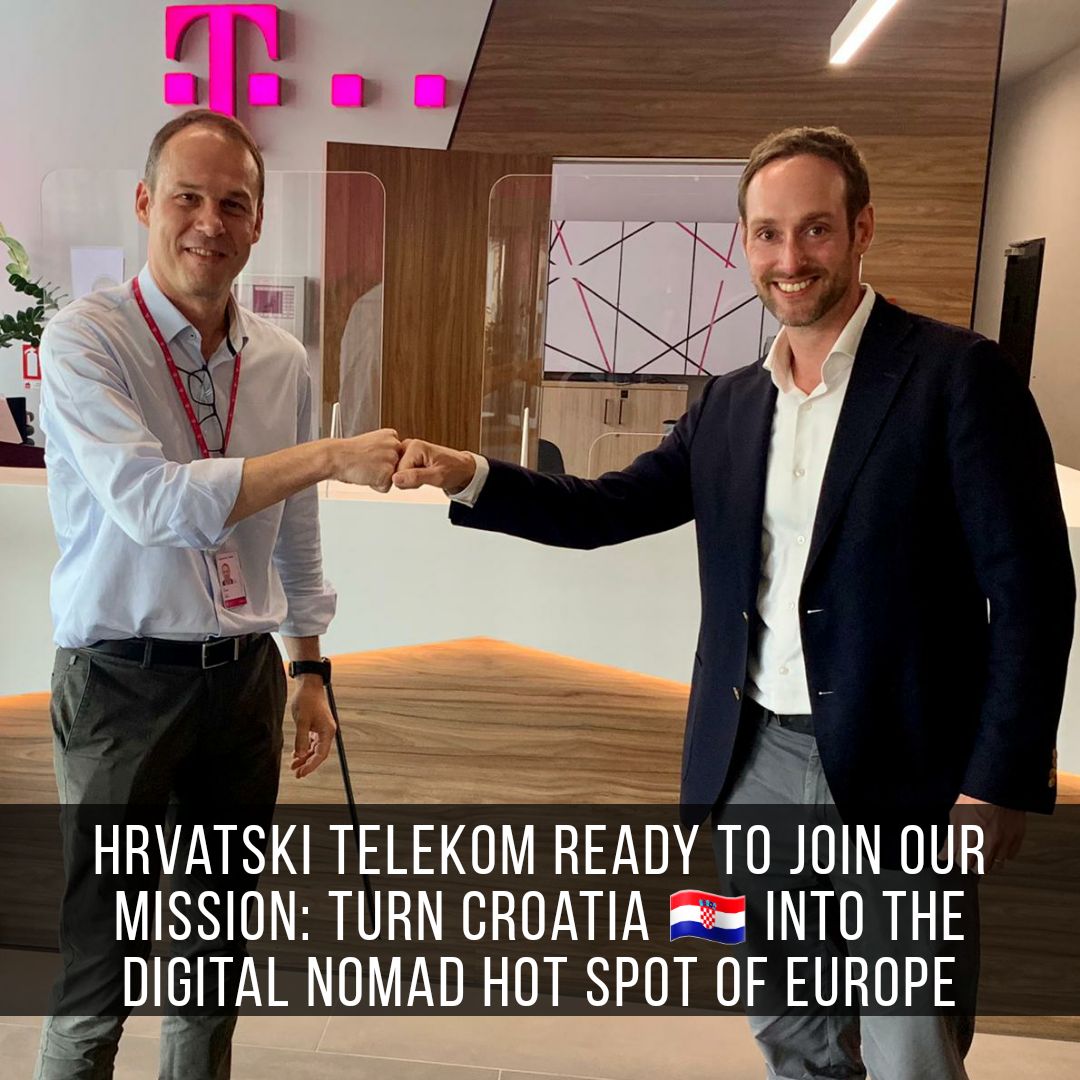
As I wrote more articles of the same ilk, more of these bubbles started to connect to TCN, and I was amazed at the success stories that exist here right under our noses that few know about and even less celebrate. Simply by telling and celebrating these stories will have an impact on the default negative mindset. What is particularly exciting is that these bubbles are starting to connect now, to become aware of each other. Initiatives such as Glas Poduzetnika (The Voice of Entrepreneurs) is one such example, but there are many others. And the more they connect, the more positive stories come to light, the more the feeling that perhaps things could change in Croatia.
The whole issue of digital nomad tourism and the new digital nomad visa is a case in point. It was an industry that was new to me 18 months ago, and when TCN first started writing about it last year, the response domestically was lukewarm.
That lukewarm reaction has heated up considerably in the last couple of weeks. Back in January, I had a meeting with a Croatian partner about a digital nomad project, to be met by a blank face. That same partner called last week to urgently schedule a meeting to put into action the science fiction I had proposed just 8 months ago. These days, the inbox is filling with enquiries on how to join the digital nomad opportunity. SO MANY people with really interesting perspectives and their own Croatian bubbles of positivity have also got in touch, and it really feels that this is building up a head of steam for real change.
The big breakthrough, of course, was the spectacular progress of the planned introduction of the digital nomad visa, thanks to Dutch entrepreneur Jan de Jong, who seems to have a knack of making Croatian bureaucracy look easy. Just 45 days after an open letter to Prime Minister Andrej Plenkovic, and following meetings with the PM and Interior Ministry, a digital nomad visa was brought to Parliament with the full support of the cabinet as an amendment to the Foreigners Act.
Jan's success is stunning in the Croatian context, but the fun is just starting for him, I suspect. We caught up for a beer after his meeting with PM Plenkovic last week, and he told me of all the people contacting him wanting to contribute, to share ideas, to get some free promotion. Among them, more Croatian bubbles of positivity which now see an opportunity for change and want to connect.
Jan's latest LinkedIn post shows another high-profile ally on board with the digital nomad initiative, Kostas Nebis, President and CEO of Hrvatski Telekom, as Jan explains:
A few hours after my meeting with our Prime Minister Andrej Plenkovic, I had the pleasure of meeting Kostas Nebis - President & CEO of Hrvatski Telekom together with his team.
By Croatia becoming among the first countries in the world to welcome digital nomads, amazing new business opportunities will open up for Croatia's entrepreneurs.
Thank you Kostas Nebis for your kind invitation and constructive meeting where you have shown that Hrvatski Telekom is ready to do its part and contribute to our joint mission of turning Croatia into the European hot spot for hosting digital nomads.
Svijet boljih mogućnosti
#LivingTheCroatianDream #entrepreneurship #Croatia #digitalnomads
There is a growing swell of support from the entrepreneurs of Croatia - both local and foreign - for positive change. The eco-system out of the spotlight is getting stronger by the day, and slowly - at least I think so - a few more people are starting to believe that change is coming at last to Croatia. Of course there is a long way to go to overturn that default negative mindset, but these are truly exciting times.
Have you connected your bubble of positivity yet?
For the latest travel info, bookmark our main travel info article, which is updated daily.
Read the Croatian Travel Update in your language - now available in 24 languages
Croatian Government Introducing New ID Cards, Regulating Digital Nomads
August 28, 2020 - On Thursday, the government accepted and sent to the parliamentary procedure amendments to the Law on Identity Cards and the Law on Foreigners, which should also regulate the temporary stay of digital nomads.
Novi List reports that according to the draft proposal for amendments to the Identity Card Act, which will be applied from August next year, in accordance with the European Parliament regulation on strengthening the security of Union citizens, the new identity cards will contain biometric identifiers in the form of faces and two fingerprints in interoperable digital formats.
Deputy Prime Minister and Minister of the Interior Davor Bozinovic reported that the age limit for issuing permanent identity cards has also been changed. It has been raised from the age of 65 to 70, while the identity card for citizens from the age of 70 will be issued with a validity period of five years.
Amendments to the law also prescribe the obligation to withdraw from the use of identity cards issued without a validity period that do not meet the minimum security standards. In addition, the new ID card will contain a two-letter Croatian mark printed on the front in a blue rectangle surrounded by 12 yellow stars.
"Apart from the amendments made to harmonize with the Regulation, the proposed amendments to the law would enable the use of electronic ID cards on mobile devices, and not only on personal computers as before. Citizens are given the opportunity to access electronic services and validly electronically sign documents using mobile phones or tablets. Citizens will not pay extra for the use of the appropriate software solution for mobile devices," specified Bozinovic.
The Minister added that these amendments stipulate the obligation for persons who have reached the age of 16 and who have been allowed by a court in a non-contentious procedure to marry in accordance with the provisions of the Family Law and have entered into marriage, to obtain an identity card if they reside in Croatia.
On Thursday, Bozinovic also presented a proposal for the Law on Foreigners, which stipulates that the Government no longer makes a decision on determining the annual quota of permits for employment of foreigners, but employers are already obliged to request the Croatian Employment Service to conduct a labor market test before applying for a residence and work permit for foreigners.
"If it is determined that there are no unemployed persons in the Republic of Croatia who meet the requirements of employers, employers should submit a request for a residence and work permit to the Ministry of Interior, which will ex officio ask the Croatian Employment Service for an opinion on the employment of a foreigner with a Croatian employer. The procedure for issuing residence and work permits, including the implementation of the labor market test, can take a maximum of 30 days," explained Bozinovic.
The Minister added that the bill prescribes exceptions to the implementation of the labor market test related to occupations such as carpenters, masons, waiters, butchers, and in the case of seasonal work up to 90 days in agriculture, forestry, catering, and tourism.
In order for the Government not to be obliged to re-issue the Decision on determining the annual quota of permits for the employment of foreigners, it is prescribed that the Law on Foreigners enters into force on 1 January 2021.
According to the proposal of the new law, a new institute of long-term visa is introduced, the so-called D visa, in case a third-country national is granted temporary residence due to work, family reunification, study, research, and secondary education.
Furthermore, the novelty is the prescribing and more favorable regulation of temporary and permanent residence for members of the Croatian people with foreign citizenship or statelessness, who have a certificate from the Central State Office for Croats outside the Republic of Croatia.
In addition, under more favorable conditions, family members of a Croatian citizen can acquire permanent residence, as well as foreign minor children who have been granted temporary residence for three years, and one of the parents has been granted permanent residence or long-term residence.
Bozinovic also announced a novelty which prescribes the possibility of regulating the temporary residence of digital nomads, i.e., foreigners who perform jobs digitally for foreign employers.
For the latest travel info, bookmark our main travel info article, which is updated daily.
Read the Croatian Travel Update in your language - now available in 24 languages
This is What Happens in Croatia When You Start Telling the Positive Stories
August 27, 2020 - What happens in Croatia when you replace the default negative mindset with its many positive stories? Something like this.
About 18 months ago, I wrote an article called The 3 Stages of Learning for a Foreigner in Croatia: Love, Hate and Nirvana.
Nirvana took me 15 years to achieve, but I finally got there, made my peace with the Mighty State of Uhljebistan, committed to paying my 'uhljeb tax' for the right to enjoy the best lifestyle in Europe, and I have to admit - it was worth the wait.
On the journey, I realised some things which were actually pretty obvious, but which are key to a happy life here. Among those was the golden rule of surrounding yourself with positive people. In a society which is default negative, the positive voices in Croatia are drowned out. Many do not voice the positivity publicly, as the negative comment will inevitably follow.
During my journey with TCN, I have come across so many incredible people doing truly amazing things. And - as I have written before - I have discovered so many positive people who exist in their own little bubbles. They love the Croatian lifestyle, but they choose to minimise their contact with the Croatian state. Friends, family, job, nature, lifestyle. A great bubble.
The thing is, though, that these bubbles are now beginning to realise that there are many like-minded bubbles out there too. And those bubbles are starting to connect. A VERY healthy eco-system of positivity and Croatia 2.0 mentality is slowly building, and it is truly a joy to watch.
There are only really two problems in Croatia - the system and the mindset. We can't change the system but we can change the mindset, one positive story at a time.
There is a third problem in Croatia, which I call the Death of Hope, and which perhaps a million people in Croatia can relate to. They all desperately want change, but they no longer believe that change is possible. Any new initiative is dismissed because, well... this is Croatia.
But what if some of those initiatives started to actually work? What if all the positive stories were told, embraced and celebrated? What if one million people resigned to the Death of Hope slowly began to believe. And then demanded change with one voice.
It is already starting...
Yesterday's announcement by Croatian Prime Minister Andrej Plenkovic that his administration will introduce a digital nomad visa just 44 days after receiving an open letter from Dutch entrepreneur Jan de Jong is truly a stunning development for those familiar with Croatian bureaucracy.
It is also a sign to those one million people, whose Croatian perspective is clouded by the Death of Hope, that perhaps change is possible after all. And if we can lift those one million people to believe, a tsunami of positivity will tip the scales in the direction of positive change.
This is a blog I have been planning to write for a while, but time has been against me. And then, my LinkedIn feed brought me to this post from Zvonimir Matutinović, Senior Stakeholder Manager for Digital Marketing Automation at Teva Pharmaceuticals:
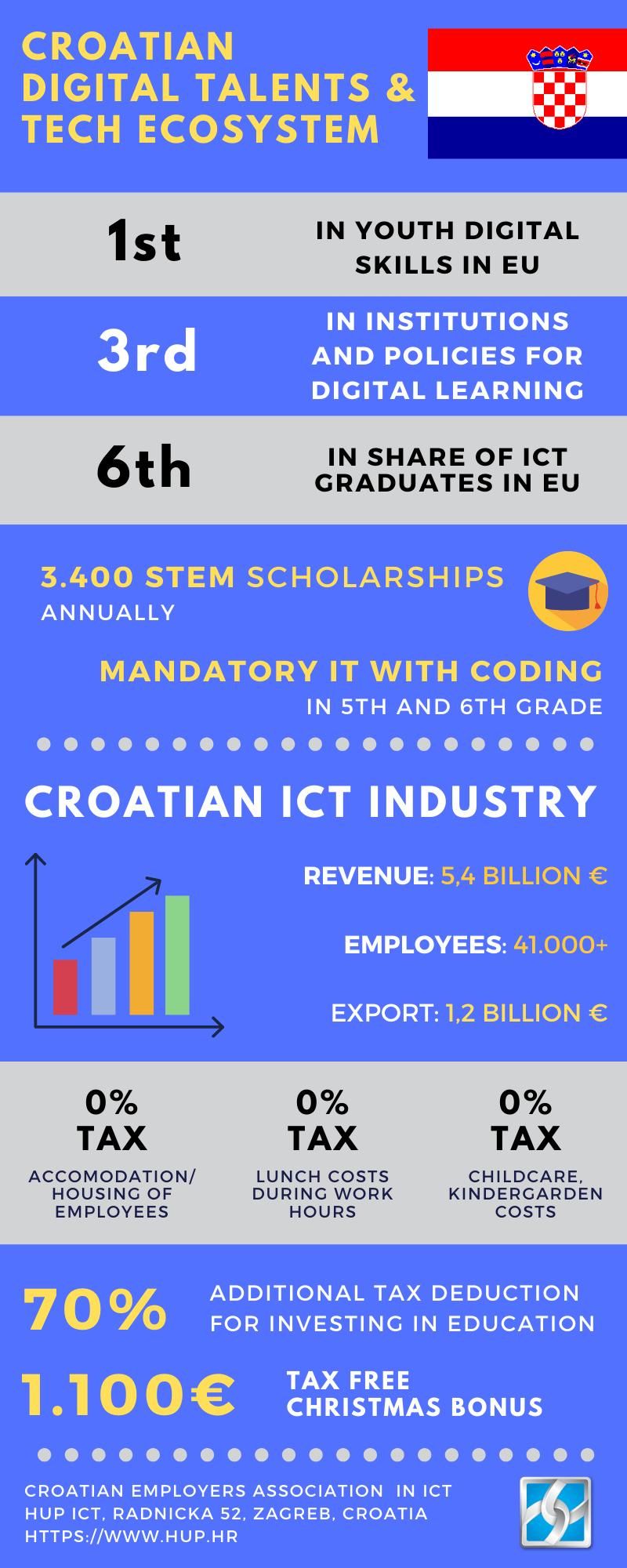
"Rome wasn't built in a day". We could probably use this analogy for Croatian digital industry and its eco-system as well.
A few years ago I used to think we were failing miserably. However, now, when I look at some initiatives and numbers, I think we are doing pretty well. Yesterday our Prime Minister announced that Croatia will start welcoming IT professionals from all over the world by launching a Digital Nomad Visa (good job Jan de Jong).
In 2018 people asked me how it was possible for such a small country to reach the World Cup finals? My answer was, because of the persistence and a few people who had faith. Today in 2020 if someone asks me how we managed to create such a good pool of digital talents, my answer is the same: some people were persistent and they believed it could be done.
Let's push further!
****
Multiply that by a million people.
Celebrate the positives, tell the positive stories, connect those bubbles, surround yourself with positive people, and keep pushing for change. The moment is now for Croatia.
Digital Nomad Life in Croatia: Cyndie Burkhardt, from NYC to Global Citizen to Split
August 27, 2020- As the number of digital nomads rises globally, some are choosing to spend some of their time in Croatia. Continuing our TCN series meeting international digital nomads calling Croatia their temporary home. Meet Cyndie Burkhardt, from NYC to Global Citizen to Split.
As recently featured on TCN, the world is projected to have a billion digital nomads by 2035, people from all over the world doing all manner of jobs and business with one thing in common - a flexible, mobile workplace connected to the Internet. If even a fracture of that number becomes a reality, the economic opportunity for countries which can attract these wealth-generating individuals has the potential to dwarf Croatia's current tourism revenues. And there are few countries better placed than Croatia to take advantage. Safe, beautiful, great gourmet scene, top tourist destination, English is widely spoken, well connected to other destinations, and a superb lifestyle.
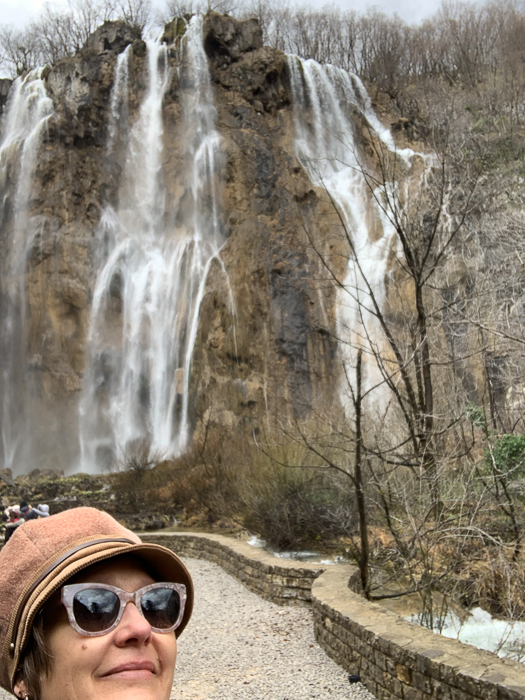
In order to look at the issue in more detail, we have decided to look at some of the digital nomads who have Croatia in their lifestyle plan, and to find out why Croatia, what Croatia offers, and what are the things that countries should be looking out for to take advantage of this economic opportunity. I am very grateful to Tanja Polegubic from Split's waterfront co-working space, Saltwater in Split for her help in connecting me to various digital nomads using her space.
Our next digital nomad in Croatia is Cyndie Burkhardt currently in Split, a long way from home in New York City.

Split has a growing number of digital nomads. Tell us briefly who you are and what you do.
Hi, I'm Cyndie Burkhardt and I’m from New York City, in the U.S. I’m a certified holistic health coach, photographer, and digital storyteller. A year ago I left my home to travel and live in 12 countries in 12 months. My plan was to explore health and wellness in different societies around the world, learning first-hand, from real people. I found diverse healing practices, met a lot of interesting characters, had amazing experiences, and gained a broader perspective on what “health” means. All along, I photographed and wrote about these adventures and created stories that are told through the lens of lifestyle and culture. (The project is on my website.) Then COVID-19 cut my travels short. My journey took a different turn and unfolded in ways I couldn’t have imagined. I arrived in Split on March 1 and a week later travel restrictions, shutdowns, and flight cancellations were being put into effect. I decided to stay because Croatia was very responsive to the pandemic early on and it seemed safe here.
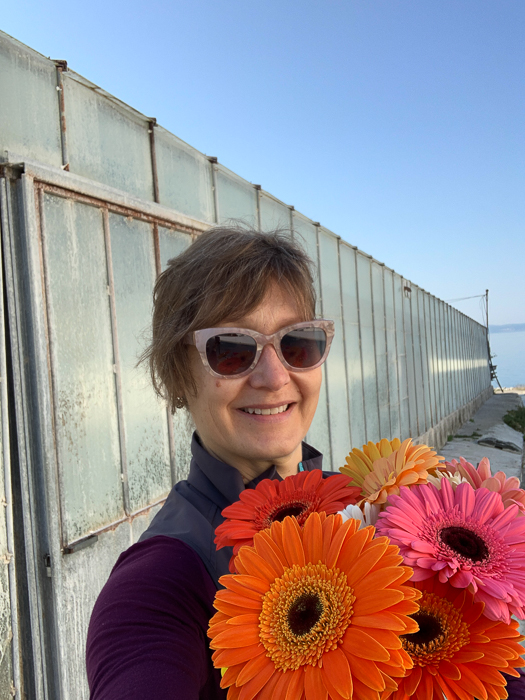
You originally planned to be here for one month and now it’s much longer. How does this affect your work?
First of all, let me say that staying here longer than a month has given me an opportunity to get to know Croatia better, which I’m super excited about. I’m happy for every chance to see more of this beautiful country and meet its people. Being a little more settled, meaning I don’t have to pack up all of my things and race off to the next destination, has helped me create a workflow and a routine. Instead of rushing to complete my project in a few weeks, I’m able to develop it in more detail. I’m looking at long-term work opportunities which are remote and web-based. I would love to start something here, possibly collaborating with local Croatians and expats.
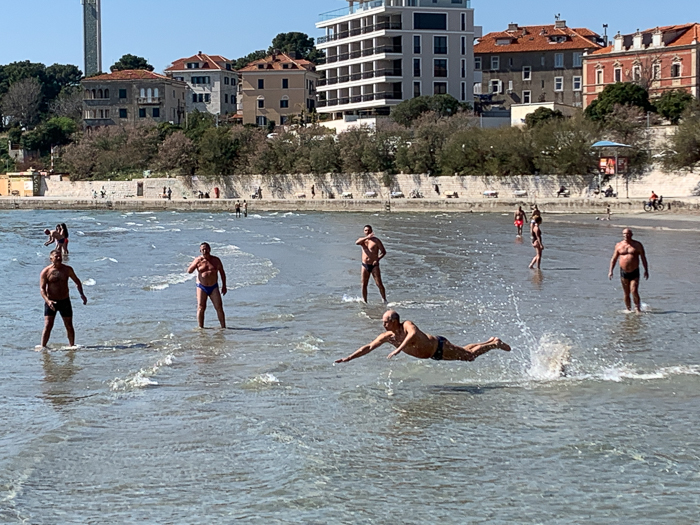
Working from a laptop rather than an office seems like an ideal lifestyle. What are the pros and cons?
I’ve been working remotely on a laptop for several years, sometimes from home and sometimes from an office or workspace. The pros are being in control of my schedule, for the most part, and having the freedom to work in different locations. I have more flexibility to schedule the time I need for self-care, for cooking and eating good food (better than grabbing fast food or eating out, which is typical with office life), getting enough sleep, exercising, and socializing. Being able to structure my days to include things that are important to me while still getting my work done empowers me to work harder when I am on the computer. I’m probably more efficient with work because I can completely manage my own time.
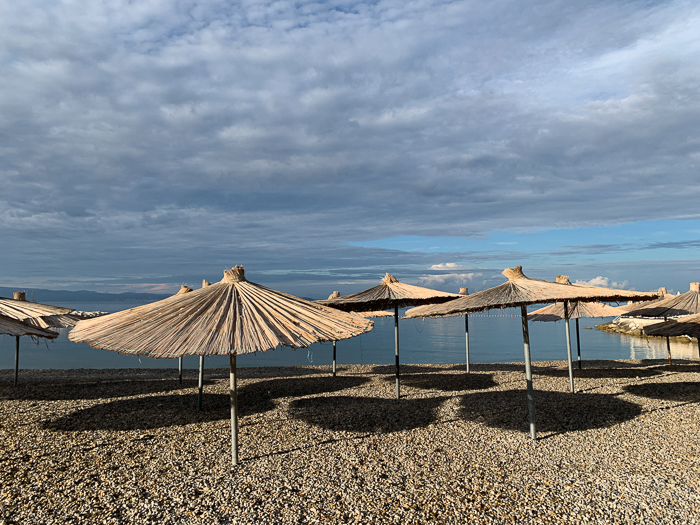
That being said, the cons are the ease of jumping on the computer at any time and sometimes working too much, having to maintain some sort of organized structure to connect with people who work within traditional work hours and also different time zones, and often being isolated and alone. It’s important for me to find time outside, whether that means jumping into a workspace or a café periodically to change my environment and to be around other people. Sometimes it’s just going for a walk to clear my head.

How did you choose Croatia and specifically Split?
I visited Croatia 19 years ago, in Istria, and I loved it. I always wanted to come back and spend more time here and see the entire Dalmatian Coast and the islands. Of course, I had no idea how things would turn out to make my dream come true! When I decided to travel, I went with a company called Remote Year and Split was on their itinerary. The company considered the country and the city safe, well-connected, and wired for a digital working community. It’s got great atmosphere, people, food, and the healthful Mediterranean lifestyle. I also learned about “pomalo.” Things fell into place perfectly.
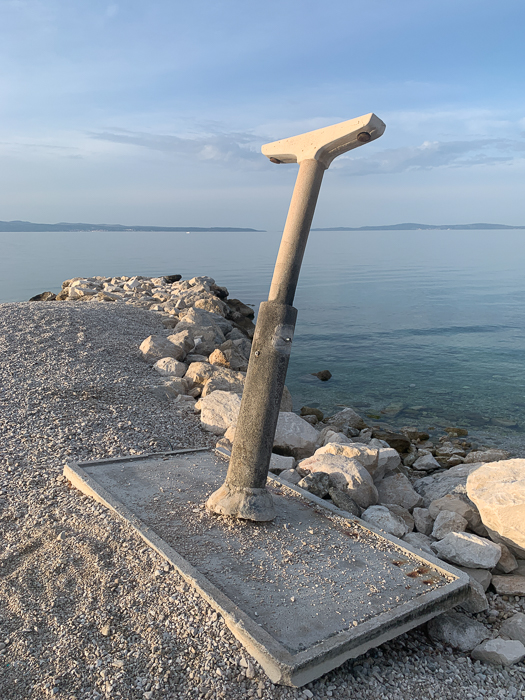
For me personally, discovering the expat community and continuing to meet new friends has been a huge bonus. I grew up on the East Coast of the U.S., in Cape May, New Jersey, at the seashore. It is identical to Split in terms of being a small beach community, the tourism season, the weather (minus your crazy bura and jugo winds!), plus the brilliant sun, salty air, and refreshing water. Being here completely resonates with me and makes me so happy, it’s the best of both worlds for work and lifestyle. I’ve had nothing but great days and experiences here.
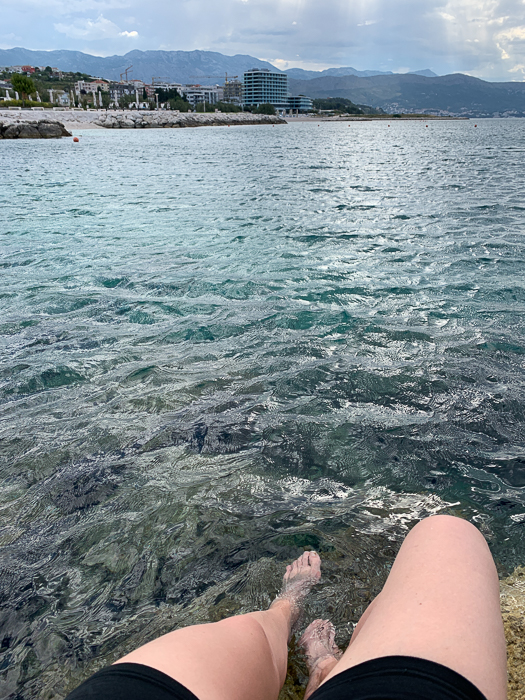
What’s important for a destination to offer to be compatible with a digital nomad lifestyle, apart from good WiFi?
Strong and reliable WiFi is most certainly on top on the list. It’s also important to have thriving co-working space(s) so there’s an environment outside of your apartment to work, socialize, and have a coffee. My experience has been really good and positive in large part because of the people I’ve met and the kindness they’ve shown me. I’ve gotten tips on things to do, places to visit, and recommendations when I’ve needed something. When I travel I’m fully engaged and interested in meeting local people, learning about the culture and history, trying all of the food, and having unique experiences. These are the basics for truly experiencing a place. Here in Split, making new connections and friends, and being able to speak English with people, has made a huge difference in feeling like I’m part of a community. All of this is shaping my impressions and my journey.

To learn more about Croatia for the digital nomad, check out the Total Croatia Digital Nomad guide.
Are you a digital nomad in Croatia who would like to be featured in this series? Please contact us on This email address is being protected from spambots. You need JavaScript enabled to view it. Subject Nomad
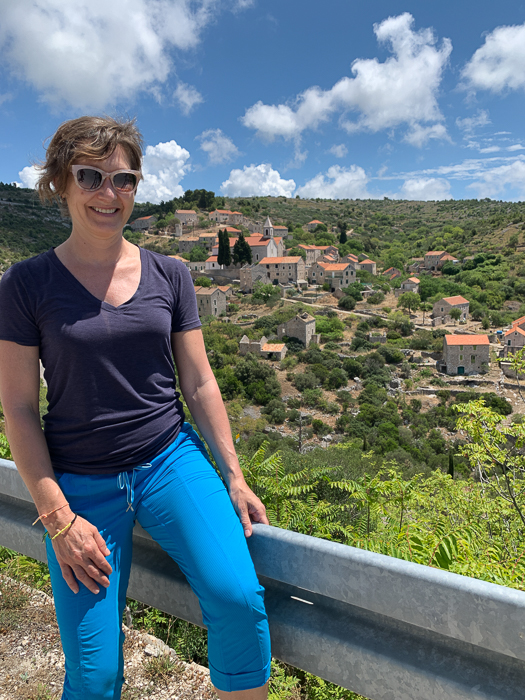
Croatia's Digital Nomad Visa Story: The Expat Contribution & What's Next?
August 27, 2020 - The announcement that the Croatian Government plans to introduce a digital nomad visa for Croatia is wonderful news, but there is so much more to ponder in the story behind it and the direction it could take Croatia.
Everyone is stunned.
The sheer speed of it.
Just 45 days after a Dutch entrepreneur wrote an open letter to Prime Minister Andrej Plenkovic asking for a digital nomad visa for Croatia, the legislative framework for such a visa will be presented by the government today with the full backing of the Prime Minister and his entire cabinet. My understanding is that the visa should be available as early as later this year.
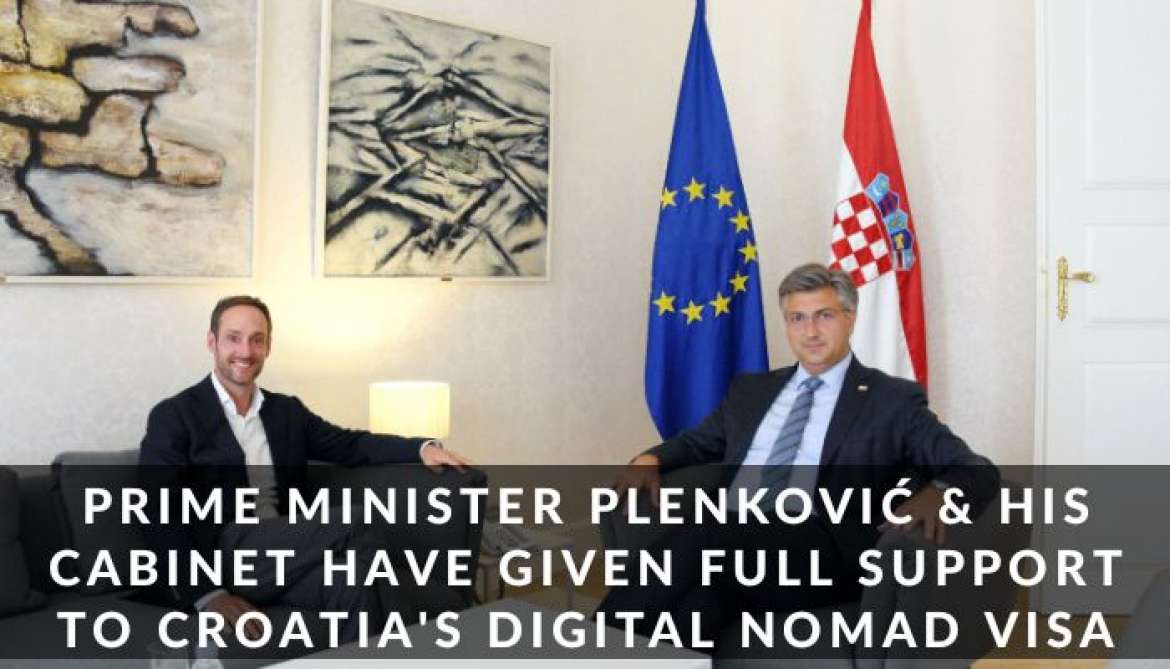
Forty-five days!
In the middle of a pandemic.
In the middle of summer.
In Croatia.
Totally unheard of. A sign - perhaps? - that the first seeds of Croatia 2.0 are beginning to take hold in the corridors of power? Perhaps, perhaps not, but extraordinary nonetheless.
Of all the topics I have written about in Croatia over the last 10 years, none has given me more diverse and stimulating feedback that the nomad topic. With no other media writing about the issue in Croatia, every article on the topic brought new connections of nomads in love with Croatia who would certainly take advantage of such an opportunity. Wealth-creating nomads. Mindset-changing nomads.
But there has also been a steady drip-feeding of feedback from another source - locals. When I first started writing about it over a year ago, many locals dismissed it as some kind of tax dodge or hippie initiative, and few took it seriously. But as the topic refused to go away, and the legacy of corona to advancing the cause of a more digital Croatia kept it in focus, more and more people began to see the opportunity. And the opportunity can be summarised in one paragraph:
Croatia has the best lifestyle in Europe. More and more people work in the same global office these days. It is called the Internet, and the office only has two real variables - connectivity (3G, 4G, 5G) and time zones. Apart from that, the office is essentially the same. When we leave the office, we go home. Many people have that home in the village they are from, surrounded by their friends, but an increasing number want to go home to lifestyle. A swim in the Adriatic before dinner, perhaps? And if Croatia has the best lifestyle in Europe, it is a natural destination for those wealth-creating mindset-changing nomads. Working online in their country of origin, spending and contributing to the community in Croatia. Not all nomads will want to be on the beach in July. We have one case of a digital nomad from Denver, who spent several months in Osijek - a city thousands are emigrating from as there is no opportunity - and found it to be one of the best places she had ever lived. It was safe, affordable, great people, fantastic food, wine and nature.
There will be an estimated 1 billion remote workers by 2035. As the lifestyle capital of Europe and with the proper approach, there is no reason why Croatia could not capture 3% of that market. And these are not visitors for a week on the beach, but longer-term arrivals - a month, three or (with the introduction of the visa) as long as they want. Currently, the only other countries which offer such a visa (and all from this year) are Barbados, Bermuda, Georgia and Estonia. 3% of arrivals all over the country all through the year would represent 30 million people using their spending power to boost the Croatian economy.
It is worth reflecting on the journey and timeline of the Croatian digital nomad visa story, as there are lessons to be learned for other similar initiatives, as well as looking at the considerable role played by expats in bringing this initiative to fruition.
I first became aware of the whole digital nomad opportunity in Spring last year when I met an Australian returnee, Tanja Polugebic, in Split, where she had opened one of the first coworking spaces in Croatia, Saltwater Split. Croatia needs to attract its young and talented diaspora, with all their ideas, and Tanja is a perfect example of someone who has returned, worked really hard and positively touched the mindset of everyone she meets. You can read her TCN interview last year here.
Listening to her vision of how Croatia could be as a digital nomad destination was fascinating, and I really hope that once the visa is introduced, that the government hires her as a consultant in order to maximise the opportunity, as she already sees the opportunities and the pitfalls, some of which she outlined in 10 Ways Croatia Will Be At The Forefront of Countries with a Digital Nomad Visa (DNV).
But it was another expat, German Andrea Wil Gerdes, who raised the issue at a Croatian conference for the first time in June 2019 at the MBA Croatia conference - How to be Globally Competitive from Croatia. His assertion that the Croatian economy could be turned around in 6 months might have sounded fanciful to many, but there was definitely something in the logic, as there had been with Tanja. The debate was moving forward.
And the more I wrote, the more contact I had with those wanting to take advantage of the opportunity, and more locals seeing the opportunity. But the biggest push came from a conversation with another expat, Dutchman Jan de Jong in Split. Due to speak at a tourism conference in May, we brainstormed a few topics for him to think about, including digital nomad tourism. And the rest is history after he presented digital nomad tourism as a strategy for the first time at a conference in Croatia. Timeline May 5 - just 113 days ago.
Six days later, a feature in the national media for the first time, and then on July 11 - just 45 days ago, an open letter to the Prime Minister.
And this is where things get interesting. In the middle of a pandemic and in the middle of the summer, not only was the response to this open letter quick, but wheels were put in motion by several ministries very quickly. A meeting at the Ministry of the Interior was a precursor to a meeting with PM Plenkovic yesterday, whose subsequent tweet of the meeting confirmed that he would be pushing for the visa.
And the timing could not be more perfect, as a debate of small amendments to the Foreigners Act is scheduled for today, and so the digital nomad visa has been added to Article 57, Point 11. With the full support of the cabinet and very little reason to object to it, Croatia should be offering this new service within weeks if all goes well.

Even more encouraging has been the coordination between the ministries, as I understood from Jan over our celebratory drink last night. Ministries are briefed and engaged, and more meetings will take place in the coming days and weeks to iron out various issues.
It is particularly encouraging that Croatia will be looking to the Estonian model for the implementation of the visa. The more that Croatia looks to Estonia to learn about administration, the better. As the undisputed Kings of Europe for digital administration, Croatia has a lot to learn from the progressive Baltic state, and let's hope that the nomad visa will be the tip of the iceberg as the country moves towards Croatia 2.0.
45 days in the middle of summer during a pandemic. A small and common sense legislation change which immediately puts Croatia at the forefront of this rapidly expanding new industry. A simple and progressive idea which was well-received and acted upon. It is particularly encouraging that ideas from outside are being considered. We all want a better Croatia, and there is no need to reinvent the wheel each time. Estonia deserves huge credit for what they have achieved with their digitalisation journey, and I am sure they would be happier than anyone if others were to adopt it.
And if things can change this quickly, what other low-hanging fruit is out there to take advantage of in a similar way, while boosting the economy without spending too much? Perhaps someone could take a look at the missed opportunity for retired people, especially when compared to Portugal. Like the nomad visa, simple to fix - Lessons from Portugal: Taking Advantage of the Retirement Lifestyle Opportunity.
Many thanks to all involved in pushing the digital nomad visa story for Croatia. The future looks a little brighter today.
For the latest travel info, bookmark our main travel info article, which is updated daily.
Read the Croatian Travel Update in your language - now available in 24 languages
Join the Total Croatia Travel INFO Viber community.
Croatian Digital Nomad Visa: PM Plenkovic and Cabinet Say YES!
August 25, 2020 - A big day for Croatia 2.0, as Prime Minister Andrej Plenkovic and his cabinet express full support for a Croatian digital nomad visa, with the process starting later this week.
I am starting to believe.
A little common sense, a lot of positivity, and the determination of a few good men and women.
Is Croatia 2.0 about to become a reality, at least in part?
The revolution of common sense and future thinking started in Estonia, then continued in Barbados and the Republic of Georgia. And today - it seems - that revolution of positivity and a brighter future, which could revolutionise tourism and the economy has reached Croatia.
The full support of the Prime Minister and his Cabinet for the introduction of the Croatian digital nomad visa.
In SUCH a short space of time, as covered by TCN.
The timeline:
May 5, 2020 - Digital Nomads Enter Croatian Tourism Conference Strategy Debate for 1st Time
May 11, 2020 - Digital Nomad Tourism Featured for 1st Time in Croatian Media
July 11, 2020 - Estonia on the Adriatic? Dutchman Asks PM for Croatian Digital Nomad Visa
July 28, 2020 - Split-Based Dutch Entrepreneur Jan de Jong: Croatia Should Introduce Visas for Digital Nomads
August 15, 2020 - Croatian Digital Nomad Visa One Step Closer? Ministry Meeting Confirmed
August 19, 2020 - Croatian Bureaucracy 2.0: Progress with the Digital Nomad Visa
August 22, 2020 - 5 Reasons Why the Croatian Digital Nomad Visa Should Exist
In the words of Dutch entrepreneur Jan de Jong, a Split resident and successful entrepreneur since 2006 on his LinkedIn profile, the latest stunning update:
****
Thank you Prime Minister Andrej Plenkovic for taking time to meet today and for recognizing this great opportunity for Croatia. ??
It is truly amazing when you see that entrepreneurial ideas and suggestions are being heard and understood by policy makers.
Our Prime Minister told me that the introduction of a digital nomad visa was discussed earlier today during his meeting with his ministers - and that the cabinet fully supported this initiative.
By the end of this week changes to the Foreigners Act shall be proposed to parliament - which basically means that within 2 months after my open letter to our Prime Minister Andrej Plenkovic here on LinkedIn - Croatia has managed to introduce a legal framework that would allow Croatia to start welcoming digital nomads ?
I believe! I really believe in a better Croatia. A Croatia:
✅ Where my children would want to stay.
✅ Where its citizens can enjoy among highest standards of living within Europe.
✅ From where digital nomads would want to work.
Thank you all for your support!
Follow me on #LinkedIn as this story is only getting better.
#LivingTheCroatianDream #entrepreneurship #Croatia #DigitalNomads
Congrats, Jan, and thanks for all your efforts.
Change IS possible.
5 Reasons Why the Croatian Digital Nomad Visa Should Exist
August 22, 2020 - The Digital Nomad Visa has become a hot topic of late. It is especially relevant right now, during the pandemic when a large number of people are working from home. Jan de Jong, a Dutch entrepreneuer in Croatia spoke to Lider and provided 5 reasons why the Digital Nomad Visa (DNV) should be implemented.
1. Projections claim that by the year 2035, there will be a billion digital nomads in the world - highly skilled individuals who are paid above average or very well, who determine their work locations themselves.
2. A visa for digital nomads would bring people from all over the world to Croatia throughout all 12 months of the year, which would enable Croatia to become a year-round tourist destination.
3. According to a survey conducted by Karoli Hindriks, nine out of ten digital nomads may choose to come to your country if you establish special visas for them.
4. A state-of-the-art and mobile workforce are ready to temporarily settle in your country and strengthen the economy with their consumer power, skills, and knowledge. The first countries to open up to them will reap huge benefits.
5. Digital nomads become a huge marketing machine to promote the country when they start writing blogs, recording bets, tweeting, and posting on social networks about Croatia and thus attract more people.
As Jan previously stated, digital nomads would be important for Croatia in terms of marketing, because they would share their experiences, videos, and photos with their friends, and also on social networks, which would be free promotion. Plus, this would be a great way to start 2021.
Read more about the challenges and opportunities for developing the digital nomad sector in Tanja Polegubic's excellent 10 Ways Croatia Will Be At The Forefront of Countries with a Digital Nomad Visa (DNV).
For the latest travel info, bookmark our main travel info article, which is updated daily.
Read the Croatian Travel Update in your language - now available in 24 languages
Join the Total Croatia Travel INFO Viber community.


